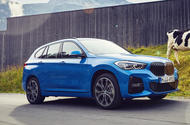New BMW X1 xDrive25e PHEV to be joined by pure electric version
Munich sets out bold emissions-reducing strategy, including EV versions of popular saloon and SUV by 2023
The next-generation BMW 5 Series and BMW X1 will be available with petrol, diesel, plug-in hybrid and battery-electric powertrains as part of BMW’s ambition to introduce 25 electrified models by 2023.
The German manufacturer has detailed a plan to reduce CO2 emissions per vehicle by at least one third by 2030, claiming to have made “sustainability and resource efficiency central to the company’s strategic direction”.
The 5 Series and X1 will join the next-generation 7 Series flagship saloon in receiving full electric versions. By the time they arrive, BMW will also have launched the iNext electric SUV, smaller iX3 electric SUV and i4 electric saloon. A recently spotted prototype suggests that an electric 3 Series saloon is on the cards, too.
Over the next ten years, BMW plans to have built more than seven million electrified vehicles, two thirds of which will be fully electric.
No further details of the electric 5 Series and X1 have been given, but both can be expected to use a variant of the single-motor powertrain featured in the newly revealed iX3, which sends 282bhp to the rear wheels and offers a WLTP range of 285 miles.
The current versions of the 5 Series and X1 are already available with conventional petrol and diesel and plug-in hybrid powertrains.
BMW CEO Oliver Zipse said: “As a premium car company, it’s our ambition to lead the way in sustainability. That’s why we’re taking responsibility here and now and making these issues central to our future strategic direction.
“This new strategic direction will be anchored in all divisions – from administration and purchasing to development and production all the way to sales. We’re taking sustainability to the next level.”
As well as introducing new electrified models, BMW will work towards reducing carbon emissions from its production sites by 80% per vehicle, taking it down to 10% of its 2006 production emissions output.
The manufacturer says it will pay more attention to “upstream added value” in order to ensure the well-to-wheel environmental impact of its EVs doesn’t cancel out improvements elsewhere. As part of this, it will analyse suppliers’ carbon footprints when awarding supply contracts and work to build “the most sustainable supply chain in the entire industry”.
Read more
BMW ‘could produce 100 electrified models by 2023 if demand was there’
BMW confirms next 7 Series to be petrol, diesel, hybrid and electric
BMW iNext: high-tech electric SUV seen with less disguise
Source: Autocar
